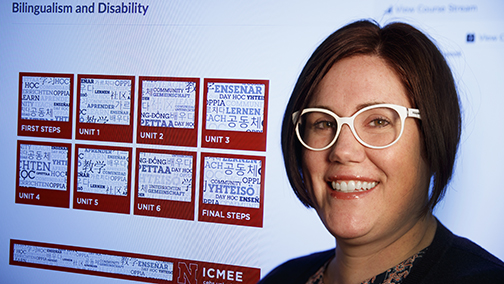
A $2.7 million professional development grant from the U.S. Department of Education will help 2,000 teachers in 11 states better serve their bilingual students. The International Consortium for Multilingual Excellence in Education (ICMEE) project is being funded from the Office of English Language Acquisition and is being led by University of Nebraska–Lincoln assistant professor Kara Viesca from the Department of Teaching, Learning and Teacher Education.
ICMEE extends from a previously funded program, eCALLMS, that Viesca helped develop when she was a faculty member at the University of Colorado–Denver. Viesca says the new project will build upon the previous work expanding online e-workshops “that are used by professional learning communities of teachers to collaboratively learn more about working with bilingual students.”
ICMEE, says Viesca, will expand the use of the e-workshops from serving teachers in Colorado, to serving teachers in 11 states, including Nebraska. Viesca’s team will also design additional e-workshops and research the impact and outcomes of participation.
More than 30 available e-workshops use a common format incorporating an essential question and five guiding questions across six units of learning. Within that model, teachers engage in a three-part learning cycle within each unit: Explore, Make It Work, and Share.
“We definitely take a bilingual approach to English language acquisition,” said Viesca. “Our focus is not only on English but also on supporting the ongoing bilingual development of students. After participating in the e-workshops, a lot of teachers report they’ve changed their perspective to focus not only on English development but on supporting the whole bilingual child. That’s something we find really positive.”
ICMEE will help teachers, particularly in general education content classrooms, overcome feelings of being unprepared to work with bilingual learners. Principles of the program include being sensitive to teachers’ busy and demanding professional lives, making it simple to embed activities into classroom practice and encouraging opportunities for teachers to engage with others online, in their buildings and across their districts.
For more information, visit the ICMEE website at http://go.unl.edu/icmee.